The Top 8 Off-Broadway Shows of 2018
From ”Be More Chill” to ”What the Constitution Means to Me”, here are our critic David Gordon’s picks.
The best off-Broadway shows of 2018 ran the gamut. They introduced us to fascinating new writers whose voices are sure to become important to the American theater. They reinvigorated age-old classics and crossed genre boundaries. In alphabetical order, here are the top eight productions I saw all year.
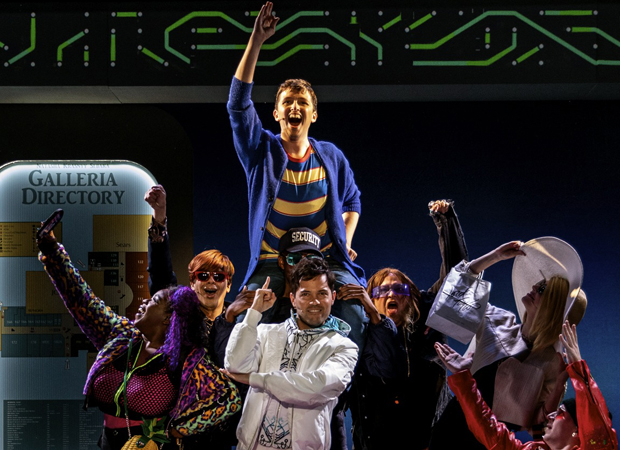
(© Maria Baranova)
It's not often that viral sensations come out of the theater, so it's safe to say that Joe Iconis and Joe Tracz's Little Shop of Horrors-like sci-fi musical Be More Chill is the first off-Broadway show to sell out its entire run based on Internet fandom. One of the most immensely fun new musicals this year, Be More Chill is bolstered by a clever book (Tracz), a score that effortlessly blends the classic with the contemporary (Iconis), and star-making performances from Will Roland and George Salazar. If you missed it this summer, have no fear — it moves to the Lyceum in February. But you might want to get your tickets, like, now.
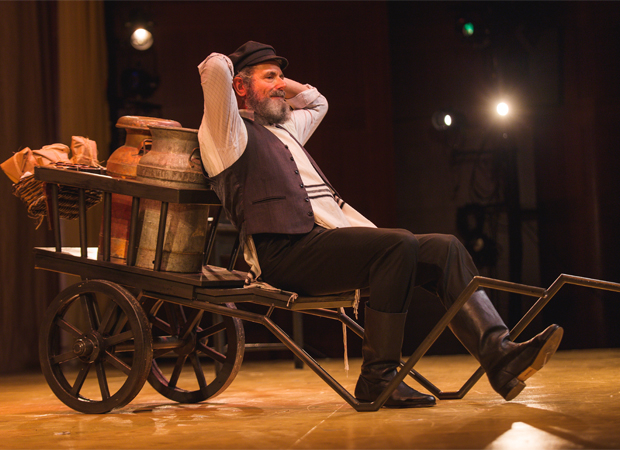
(© Victor Nechay)
2. Fiddler on the Roof (A Fidler Afn Dakh)
Expectations were modest for the National Yiddish Theatre Folksbiene's Yiddish-language production of Fiddler on the Roof, but I quickly realized what a meshuggener I was for having doubts. There wasn't a single inauthentic note in Joel Grey's exquisitely moving production, and the company, led by the absolutely amazing Steven Skybell, was top notch. After months of well-earned extensions (in true "Miracle of Hanukkah" fashion, the run was supposed end on August 26, but December 30 was ultimately named the final performance), the production heads to off-Broadway's Stage 42 in early February for an open-ended engagement.
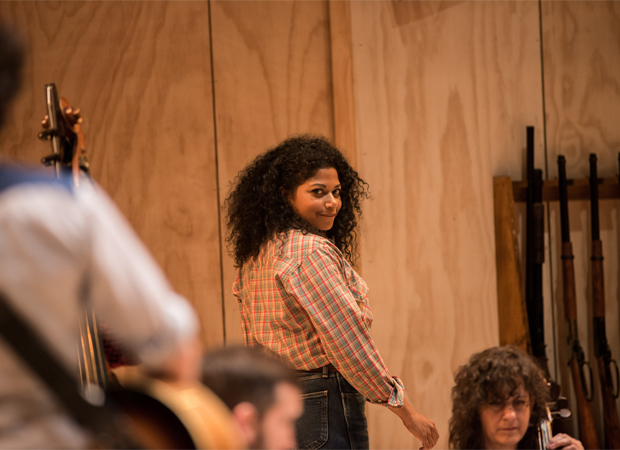
(© Teddy Wolff)
3. Oklahoma!
You think you know everything about a show, and then you see a new production that blows 75 years of history out of the water. Such is the case with Daniel Fish's blistering, immersive take on Rodgers and Hammerstein's Oklahoma!, which ran this fall at St. Ann's Warehouse after premiering at Bard College in 2015 (it transfers to Broadway in March). Fish pared a huge ensemble down to 11, had Daniel Kluger reorchestrate the score for a bluegrass band, and brought a whole lot of desire, anger, and longing into the forefront of a text where it always just simmered under the surface. The result was the sexiest Oklahoma! ever, and the angriest, too.
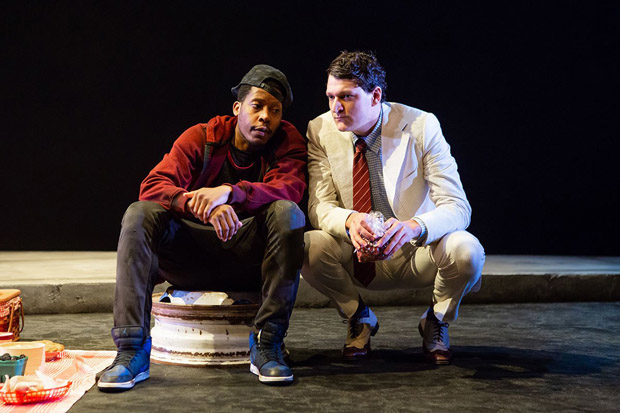
(© Jeremy Daniel)
4. Pass Over
In Pass Over, an LCT3 production directed by Danya Taymor, playwright Antoinette Nwandu riffs on the Book of Exodus and Samuel Beckett's Waiting for Godot to tell the story of two black men struggling to get off their street corner and into the "Promised Land." A truly visceral experience, Pass Over is one of the more startling plays of recent memory, exploring uncomfortable truths about the existence of racial bigotry in America with gripping theatricality and wonderfully poetic writing. Filled with uncompromising twists and turns, its final moments were particularly terrifying.
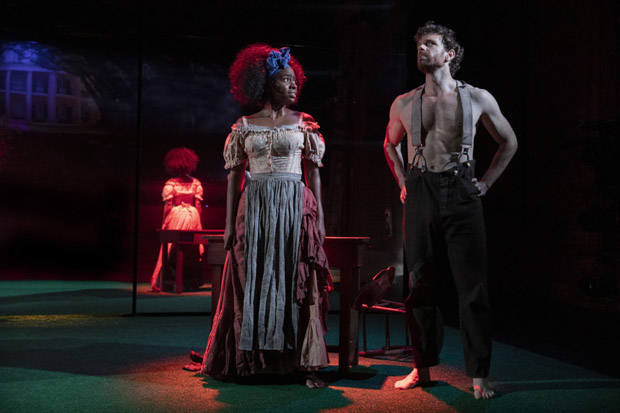
(© Joan Marcus)
5. Slave Play
To describe the plot of Slave Play is to ruin the plot of Slave Play, so I'll just say this: Jeremy O. Harris has written a real doozy of a debut. Intelligent dramas — ones that don't pander to the audience or provide easy answers — are hard to come by these days, and Slave Play grabs the New York Theatre Workshop audience by the throat from the first second, and then spends two uninterrupted hours challenging the way they think about race, sex, and their effects on the world at large. I've never seen a play quite like this, nor a performance as layered and provocative as the one given by Teyonah Parris.
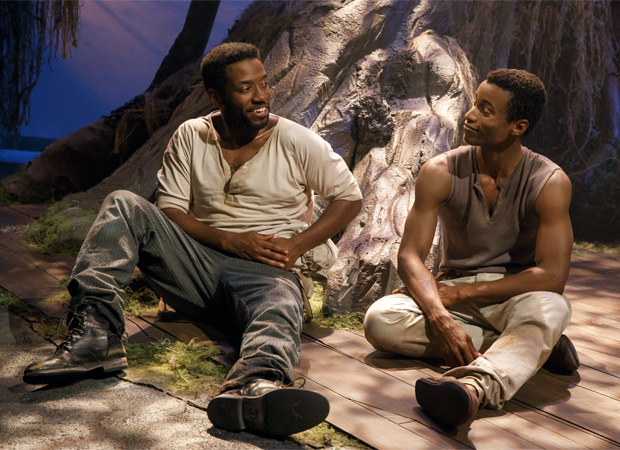
(© Joan Marcus)
6. Sugar in Our Wounds
Donja R. Love's Sugar in Our Wounds, which played Manhattan Theatre Club, is the first part in a trilogy about same-sex love at pivotal moments in black history, where gay narratives haven't previously been explored. Set on a plantation in 1862, this beautiful and heartbreaking drama finds two male slaves falling in love, and all of the consequences that follow. Love's breathtaking play was made even better by Saheem Ali's gripping, high-stakes production, Arnulfo Maldonado's imposing, mystical set, and an entirely excellent ensemble cast led by Sheldon Best and Chinaza Uche.
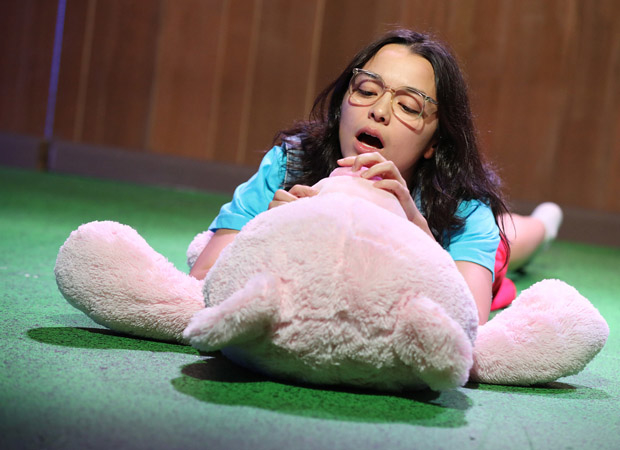
(© Joan Marcus)
7. Usual Girls
In just 90 minutes, playwright Ming Peiffer covers a huge range of subjects, including racism, alcoholism, and sexual abuse, to paint a fearless portrait of growing up female and Korean in the United States of America. Piquantly funny and altogether harrowing, Usual Girls was directed with uncompromising rawness by Tyne Rafaeli, and performed by a fantastic ensemble that leaned into the play's scorching realism. Midori Francis, a standout in The Wolves, proved her mettle and delivered the single bravest performance seen on a New York stage this entire year.
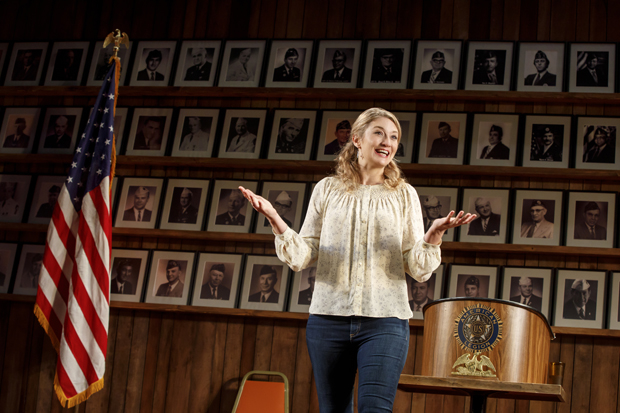
(© Joan Marcus)
8. What the Constitution Means to Me
I cried twice during Heidi Schreck's life-affirming What the Constitution Means to Me. A warts-and-all exploration of the US Constitution as a living, breathing object, Schreck introduces us to her teenage self, who paid for college by winning oratory competitions, while taking a blisteringly specific look at the way our country's founding document impacts women's bodies. Opening at New York Theatre Workshop during the Christine Blasey Ford-Brett Kavanaugh testimonies, What the Constitution Means to Me was perhaps the most politically important production of 2018, and also the most inspiring.







